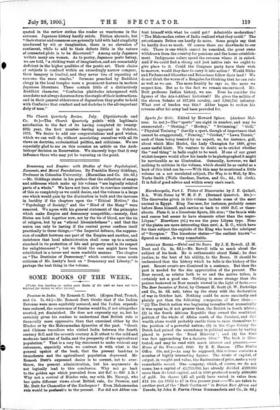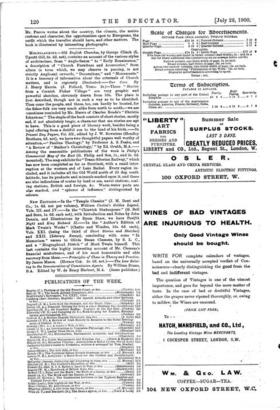Arercasr Boma—Natal and the Boers. By J. E. Rowell. (J.
M. Dent and Co. 2s. 6d.)—Mr. Rowell tells us much about the subject of his book. He is enthusiastic about Natal ; he does justice, to the best of his ability, to the Boers. It should be understood that the history which he tells is the history of the past. Recent events are dismissed in a sentence. But then the past is needed for the due appreciation of the present. The Boer record, as relates both to us and the native tribes, is certainly not a good one. Nothing is more strange than the praises bestowed on Boer morals viewed in the light of facts.— The Boer Invasion of Natal, by Clement H. Scott (S. W. Partridge and Co., 2s. 6d. net), takes up the story with the declaration of war in October last. Nothing could be more succinctly and plainly put than the following conspectus of Boer ideas : "(1) The Dutch nation was beginning to realise that numerically it was equal to, if not greater than, the British in South Africa ; (2) in the South African Republic they owned the wealthiest portion of the whole of Africa south of the Zambesi, and thi9 wealth alone would probably enable them to raise themselves to the position of a powerful nation ; (3) in the Cape Colony the Dutch had gained the ascendency in political matters by having placed in power the Bond Ministry ' ; and (4) the time was fast approaching for a decisive blow." The book is illus- trated, and may be read with much interest and pleasure.— Mines of the Tranwaal, 1900. By R. R. Masson. (The Statist Office. 10s. net.)—As may be supposed, this volume contains a number of highly interesting figures. The totals of capital, of output, in weight and value, the fluctuations of price, make a very remarkable record. One company, which, of course, we do, not name, has a capital of -€2,750,000, has already divided .C100,000 more than its total capital, and in 1893 produced nearly .e680,000 of gold. Its shares (.£5 all paid) have varied in value from Ell 10a. (in 1895) to £7 in this present year.—We are taken to another partof the "Dark Continent" in British East Africa and Uoanda, by John B. Purvis (Swan Sonnenachein and Co., 2s. 6d.)
1fr. Purvis writes about the country, the climate, the native customs and character, the opportunities open to Europeans, the outfit which the traveller should have, and other matters. The book is illustrated by interesting photographs.



































 Previous page
Previous page